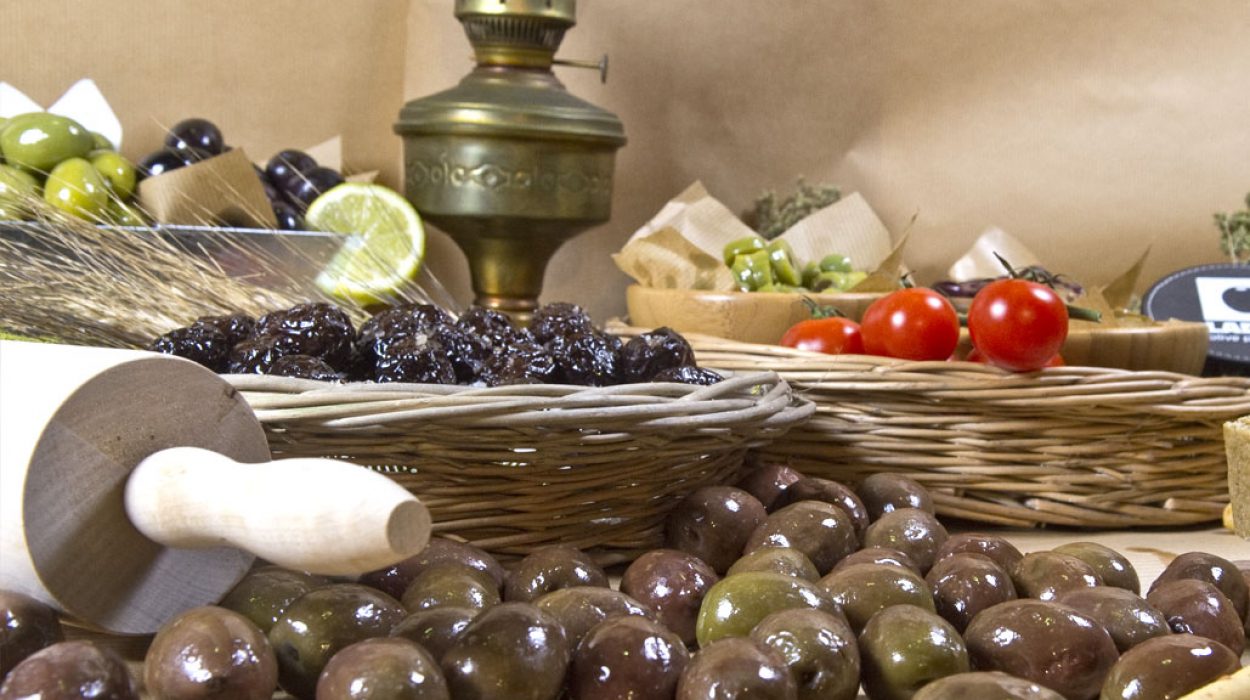OLIVE
Olive fruit is very important for the Mediterranean diet. Olives are rich in nutrients. Olive fruit is a wonderful source of monounsaturated fatty acids. Olive provides fiber and minerals to the body and is an important source of vitamin E, which is a natural antioxidant.
Olives contain monounsaturated fats in combination with tocopherols (vitamin E) and their antioxidant properties offer protection against cardiovascular disease, stroke and cancer.
Olives also contain a sufficient amount of vitamin A, which helps the body in growth-reproduction and has an important role in eye health. Both vitamin A and vitamin E contribute to skin health.
At the same time, they contain ammounts of vitamins B1, B6 and B12, which improve the proper functioning of the nervous system and boost metabolism.
The phenolic compounds contained in olives (oleuropein and tyrosol), have a beneficial effect on both cardiovascular function and prevention of tumors.
The trace elements that olives have, are: ferum (necessary for blood's good condition), phosphorus (necessary for strong bones and teeth) and potassium (necessary for the proper functioning of the heart).
Olive considered:
- the fruit with the most minerals
- the fruit with the most calcium
- rich in magnesium
- an alkaline fruit
- rich in essential amino acids
- rich in monounsaturated basic fatty acids - Ω9
- full of fat-soluble vitamins A and E
- abounding in antioxidants
Olive has the ability to dissolve toxic mucus in the human body more than any other fruit!
In ARNOLD'S EHRET classic book of natural hygiene ""THE MUCUSLESS DIET HEALING SYSTEM"" a table is provided, according to the priority of certain foods, regarding their ability to absorb and reject toxic mucus and cooked food residues from the human body. In this classification, olive is ranked first among dozens of foods with a score of 30.56, figs following second with a score of 27.81. To understand the healing power of olive, it is indicative that the orange (known to all for its secretory ability), follows third in the list with a score of just 09.61!
Olive is believed the right food for those who have problems with high cholesterol, high transaminases, hemorrhoids, headaches, leukemia, etc., as well as for athletes, manual workers and especially vegetarians and homophagous who want to increase their muscle tissue. Combines perfectly with vegetable juice or green salad.
The recommended daily dose is 10-20 olives at noon or in the evening.
The ultimate Greek Superfood!

Greece is the homeland of olive which is a blessed and timeless element of Greek culture and a fundamental fruit of Mediterranean diet. It was a symbol of peace and of "fair competing" as it was awarded instead of medals to the winners of the Olympic Games in ancient Greece. Goddess Athena, was the goddess of wisdom, who gave her gift (olive tree) to the city of Athens to ensure productivity and longevity to all inhabitants. The result of goddess's gift is the current capital of Greece to be named after her.
In Greece, olive has found ideal climate, fertile earth and the appropriate conditions that highlight its organoleptic characteristics and especially its taste, size, aroma and high nutritional value as it is among the superfoods with beneficial properties that offer health and longevity.
BENEFICIAL
PROPERTIES
- Olives contain few carbohydrates but are full of monounsaturated fatty acids (oleic-acid).
- Sodium content of olive is very high.
- Olives are rich in minerals such as calcium, ferum, magnesium, phosphorus, potassium, zinc, copper and selenium.
- Olives contain linoleic acid, which is very beneficial for breastfeed babies. Its limited presence is associated with certain skin diseases and growing problems in infants. Breastfeeding mothers should include olive fruit in their diet.
- The chlorine they contain can improve liver function, helping to eliminate waste effectively.
- Vitamins A, D, E and K contained in olives help bone growth in children and adults.
- The characteristic taste and aroma of the olive comes from the presence of polyphenols. Polyphenols are beneficial against cancer and also have important anti-inflammatory properties
- Vitamin E and other antioxidants reduce the risk of cell damage and inflammation.

VARIETIES
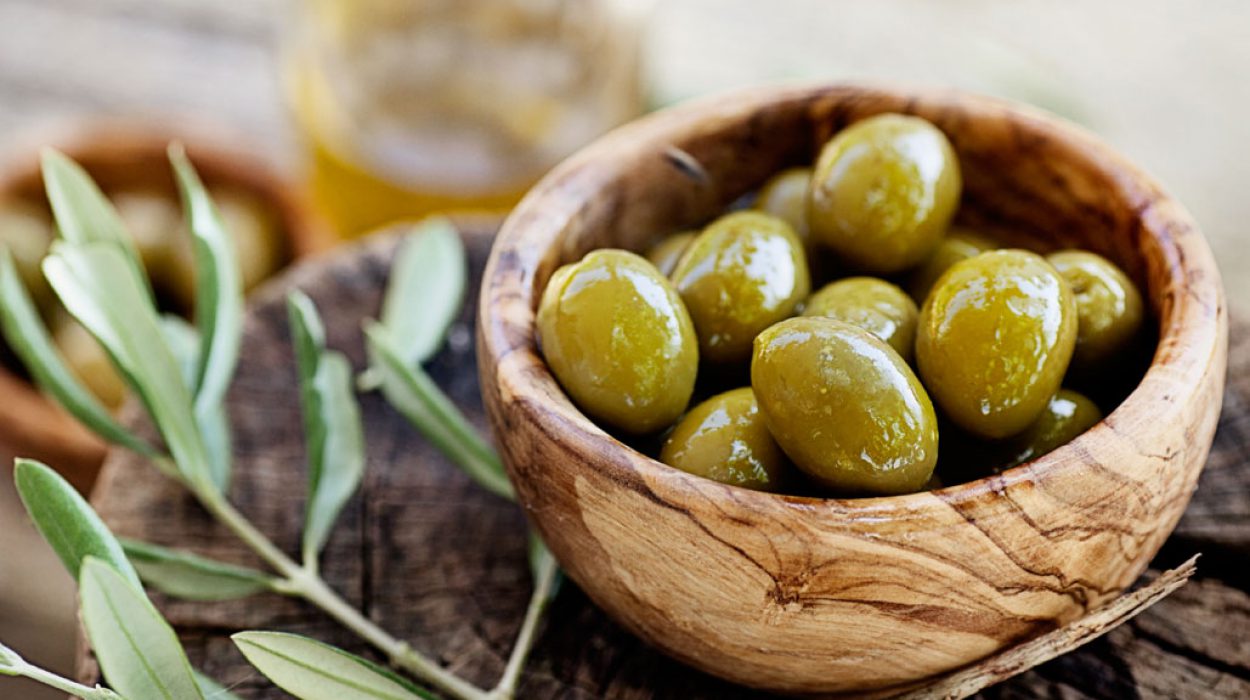
Green Olives
Halkidiki Variety
The Green Halkidiki Olive variety is cultivated almost exclusively in the area of Halkidiki and is also known as “gaidourelia”, due to the relatively large size of the fruit. This variety produces cylindrical/conical fruits that have a nipple. The weight of the fruit ranges between 4 to 14gr, most commonly 6-10gr. The flesh /pit ratio is 9: 1.
The skin color of olive fruit changes during with the maturation progress from bright green to green-yellow, straw yellow, pink and ends in faded red-black, but without ever becoming black.
Green Halkidiki olives variety are characterized by their delicate fruity aroma, their slightly bitter, spicy taste and the absence of oiliness, due to the centuries-long adaptation of the olive trees to the special soil-climatic conditions of the region, but also to the cultivation techniques applied by farmers.
The Halkidiki variety grows in all soils, even in barren stony ones. However, it performs much better in relatively fertile soils that retain enough moisture. It suffers severely in heavy soils that hold a lot of water. It prefers neutral or slightly alkaline reaction (pH 7-8) of the soil, but also tolerates slightly acidic soils.
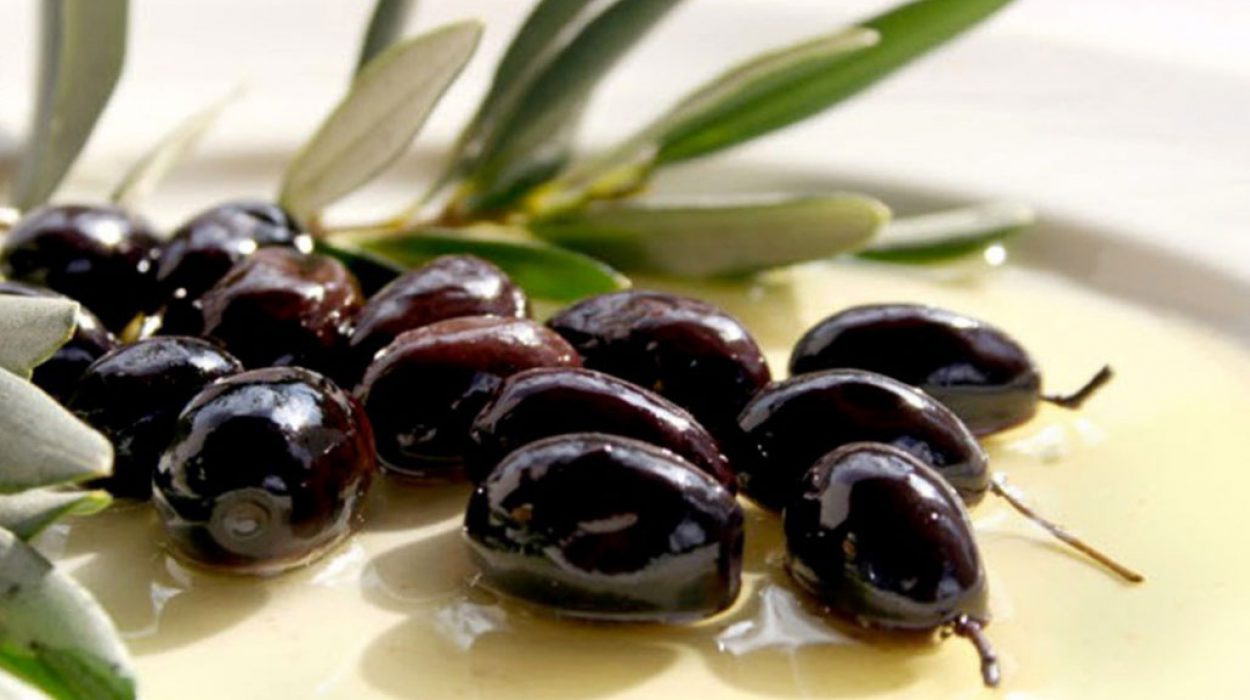
The Kalamon ‘’nixati’’ olive or Kalamata olive is one of the best table varieties, adapted to the microclimate and soils of the Peloponnese, an area where its main cultivation takes place. The fruit has a cylindrical shape and resembles grape variety. On average, the fruit weighs 5-6g and the core is smooth and easily detached from the flesh. The flesh / core ratio is 7.5: 1.
The skin of the ripe fruit acquires deep black colour. Ripening takes place in November and is extended in case of overproduction.
The Kalamata olive is a tree of normal productivity, demanding to soil and atmospheric moisture, resistant to soil salinity, dakus and Verticillium. The tree is quite strong, its branches have a climbing tendency and typically large leaves.
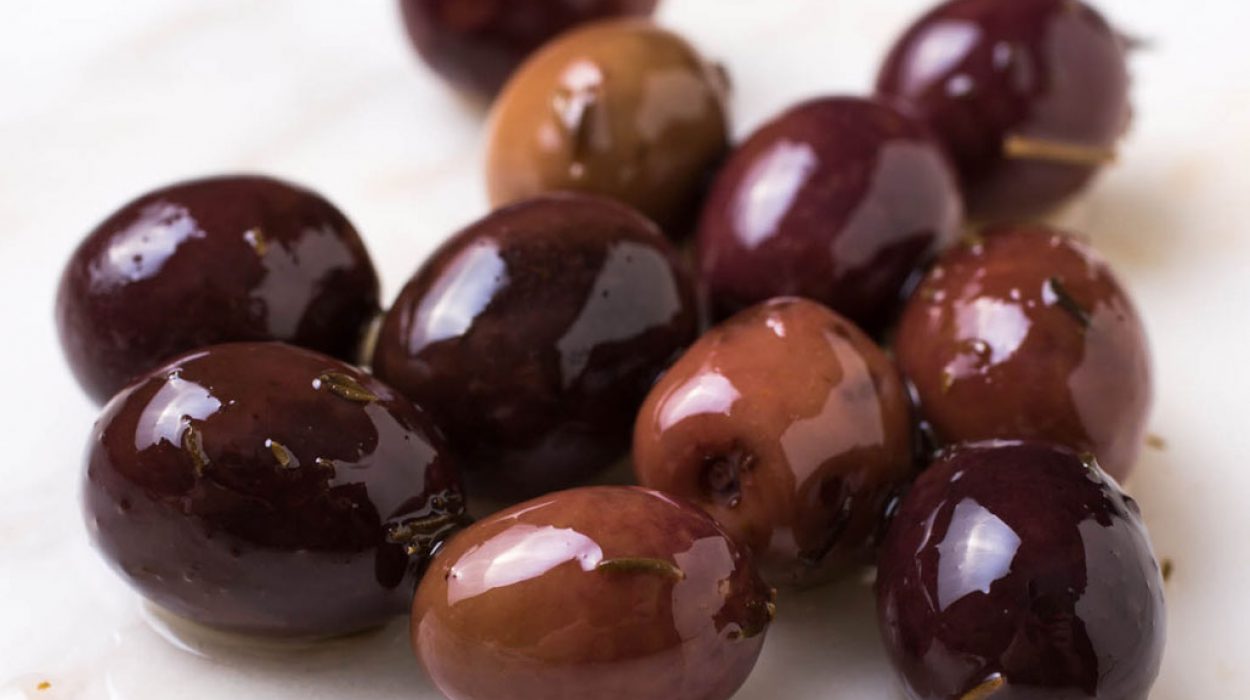
Black & Blonde Olives
The Amfissis variety olives are one of the most widespread table varieties in Greece. It is similar to the Spanish variety Manzanilla and is grown almost exclusively in central Greece but also in other areas. It is a variety of medium size 2-3 cm long and 2-2.5 cm thick, with small pit and a flesh/pit ratio of around 87-90%. Its shape is round to oval and the flesh is solid but relatively deficient in fat and fermentable ingredients.
The skin is thin and elastic, gradually changing colour from green, pink, red-violet, violet and black to over-ripening. It ripens from mid-November to late December. When intended for the production of Spanish green olives, the collection takes place two months earlier.
As for its cultivation, it grows at an altitude up to 600 meters, is relatively resistant to cold and cyclone and its weak point is the sensitivity to verticillium. It is considered very productive and does not need much watering.
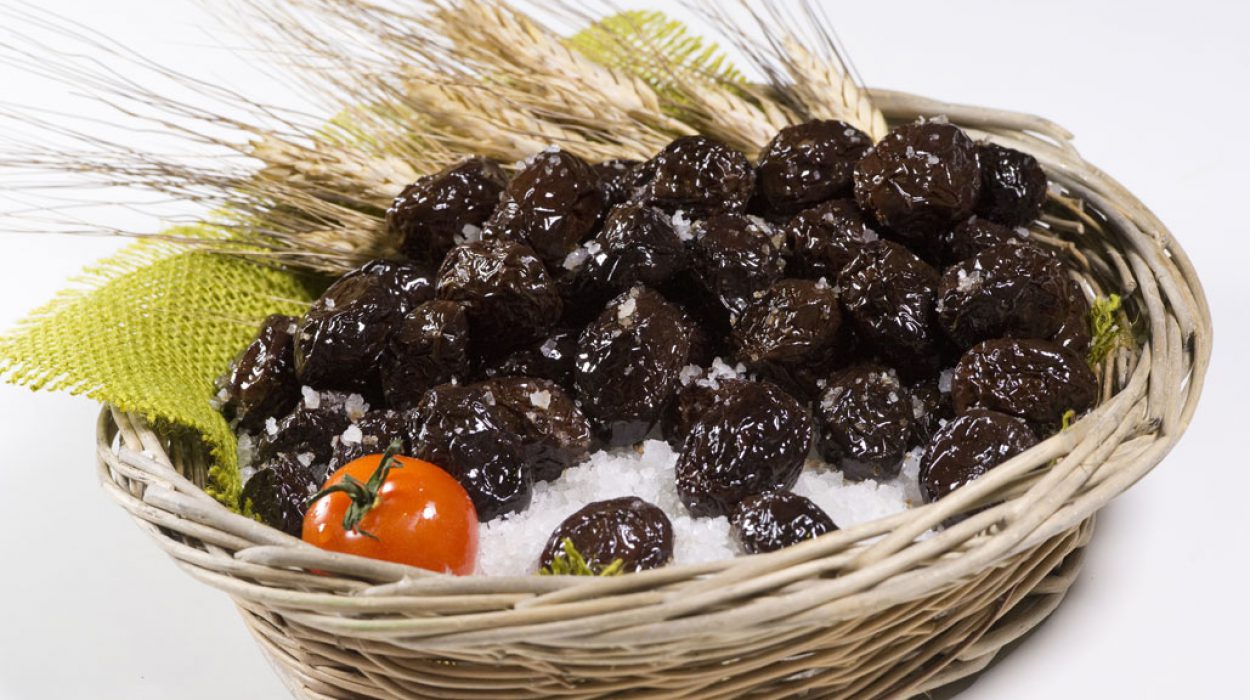
Throumba Olives
Throubes Olives is small variety, unique for its ability to stand out on the tree as it matures and takes on a copper-green colour. It is cultivated in Attica, Boeotia, the Aegean islands and Crete. The shape of the nut is cylindrical with a slight slope.
A different form of throumba olive is cultivated in Thassos but does not appear on the tree. Used to produce dried olives.
SIZES
| FRUIT CALIBER | FRUITS/Kg |
|---|---|
| ATLAS | 50-70 |
| SS.MAMMOUTH | 70-90 |
| S.MAMMOUTH | 91-100 |
| MAMMOUTH | 101-110 |
| S.COLOSSAL | 111-120 |
| COLOSSAL | 121-140 |
| GIANTS | 141-160 |
| EXTRA JUMBO | 161-180 |
| JUMBO | 181-200 |
| EXTRA LARGE | 201-230 |
| LARGE | 231-260 |
| SUPERIOR | 261-290 |
| BRILLIANT | 291-320 |
| FINE | 321-350 |
| BULLETS | 351-380 |
PROCESSINGS
Whole Olives
Pitted
Sliced
Engraved
Crushed
Raisin Olives (Halkidiki Variety)
Dried
Black Olives (Amfissis Variety)
Sweet Baked
Stuffed with
Marinated with
Orange, Lemon, Carrot, Chives, Celery, Red Pepper, Dill, Garlic, Pimiento Paste, Chilli, Chilli Pepper, Rosemary.
